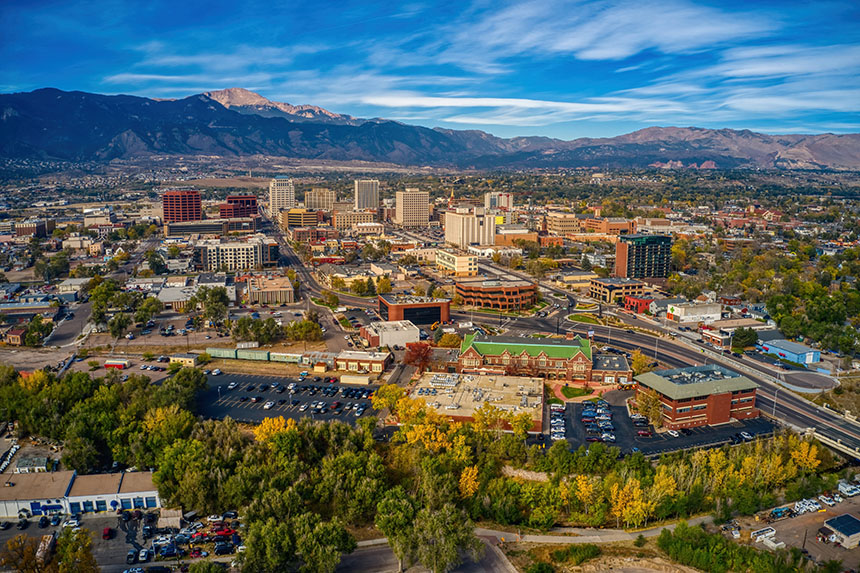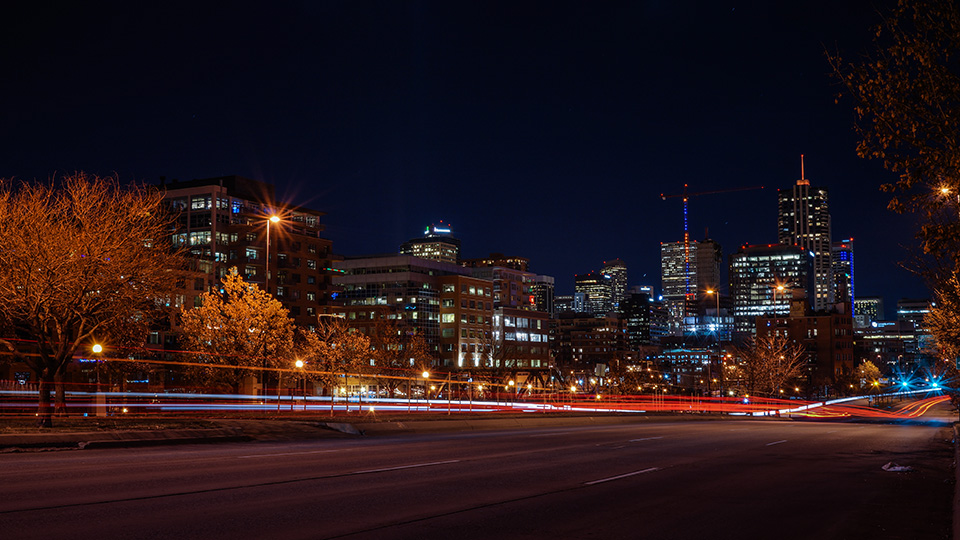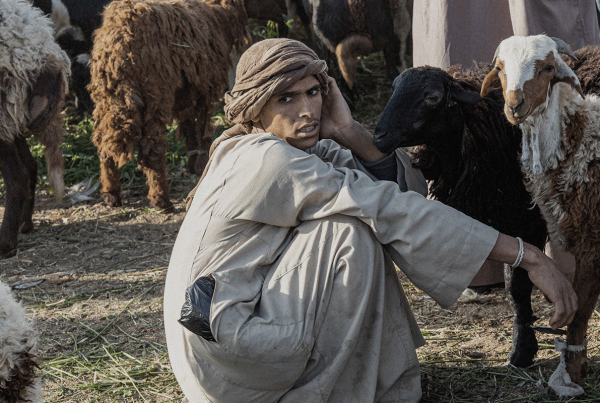Human trafficking happens in every state of the United States — including Colorado.
Although the problem is still under-documented and under-reported, nonprofits, law enforcement, and activists have made significant progress toward understanding and combating human trafficking in Colorado.

Human trafficking cases in Colorado
In 2021, Colorado earned a D/64.5 Report Card from Shared Hope, which assesses each state’s response to human trafficking. Shared Hope’s scoring is based on legislative change, taking into account both frameworks for prosecuting traffickers and trauma-informed protection available to survivors. Colorado’s score placed them in the top 10 states in the country when ranked on areas like criminal provisions, access to justice for trafficking survivors, and prevention and training.
Even though Colorado is at the forefront of fighting human trafficking in the United States, it is still rare that cases are reported, and rarer still that they make it all the way through the process of a trial. Here are some stats on what has been reported recently in Colorado.
- 137 cases were reported in Colorado in 2021, according to the National Human Trafficking Hotline. (Note that cases are not reflective of the full reality due to underreporting.)
- According to the most recent data (2014 to 2019), courts have tried more defendants on alleged sex trafficking than labor trafficking charges, but that does not necessarily mean sex trafficking is more prevalent.
- In the 2014 to 2019 timeframe, survivor services served more labor trafficking survivors than sex trafficking survivors.
Who is at risk?
According to the Colorado Human Trafficking Council, the following groups are most at risk of human trafficking in Colorado:
- Foreign nationals and undocumented immigrants
- Survivors of domestic violence and abuse
- People with disabilities
- Individuals with substance addictions
- Homeless and LGBT+ youth
- According to a 2021 report, Colorado has a higher than average number of homeless individuals, including homeless youth.
Where sex trafficking takes place in Colorado
According to the National Human Trafficking Hotline, sex trafficking is a “form of modern-day slavery in which individuals perform commercial sex through the use of force, fraud, or coercion. Minors under the age of 18 engaging in commercial sex are considered to be victims of human trafficking, regardless of the use of force, fraud, or coercion.”
These are the top venues where sex trafficking takes place in Colorado:
- Illicit Massage/Spa Businesses
- Pornography
- Residence-Based Commercial Sex
- Online Ad, Venue Unknown
- Hotel/Motel-Based
Where labor trafficking takes place in Colorado
According to the Trafficking Victims Protection Act of 2000, labor trafficking is the “recruitment, harboring, transportation, provision, or obtaining of a person for labor or services, through the use of force, fraud or coercion for the purpose of subjection to involuntary servitude, peonage, debt bondage or slavery.”
These are the industries in which labor trafficking in Colorado takes place:
- Peddling rings (door-to-door or street sales of items like flowers, magazines, or candy)
- Agriculture
- Construction
- Landscaping service
- Domestic work

Anti-trafficking legislation in Colorado
The Trafficking Victims Protection Act (TVPA), which passed in the United States in 2000, has served as the foundational piece of legislation for addressing human trafficking in this country. Since then, consistent strides have been made at the state and national levels to continue identifying and addressing vulnerabilities to trafficking.
Lawmakers have consistently codified frameworks for fighting human trafficking in Colorado. Any form of child sex trafficking in Colorado is categorized by law as a Class 3 felony, punishable by up to 12 years imprisonment and a fine up to $750,000. Here is a snapshot of other major legislative developments in Colorado’s fight against human trafficking.
- 2014: U.S. Congress passed the Preventing Sex Trafficking and Strengthening Families Act, which applied to all states, including Colorado. This act introduced new requirements for state reporting and information gathering on human trafficking. In particular, it set in place parameters for preemptively identifying at-risk populations and individuals.
- 2016: Colorado passed House Bill 16-1224, expanding the definition of child abuse and neglect to include sex trafficking of minors. It also requires all county human services departments to report suspected trafficking of minors within 24 hours.
- 2018: HB18-1018 was passed, an act requiring human trafficking awareness and prevention training as part of qualifying for a commercial driver’s license.
- 2020: Senate Bill (SB) 19-185 went into effect, expanding the definition of child abuse and neglect to include labor trafficking of minors.
Colorado human trafficking prevention and aftercare resources
If you or someone you know has been impacted by human trafficking in Colorado or if you’d like to find somewhere in your local community to learn more about trafficking here’s a list of helpful resources.
Colorado’s Human Trafficking Hotline
CALL 1-866-455-5075 or TEXT 720-999-9724
Online Directory
Organizations Supporting Survivors
- ALIGHT: legal referrals (Denver, CO)
- The Avery Center: research, survivor aftercare (Greeley, CO)
- Colorado Organization for Victim Assistance: case management, legal services, medical referrals, and job training (Denver, CO)
- Denver Dream Center: family support, food bank, clothing, reentry assistance
- Dream Center: women’s clinic, residential home for single mothers (Colorado Springs)
- Laboratory to Combat Human Trafficking: training and education in trafficking prevention (Denver, CO)
- Lutheran Family Services Rocky Mountains: immigration legal support, refugee resettlement, family support and education (Greeley, Colorado Springs)
- Rocky Mountain Immigrant Advocacy Network: legal services for immigrants who have been trafficked (Westminster, CO)
- Sarah’s Home: aftercare home for girls 12 to 18 who are survivors of sex trafficking
- TESSA of Colorado Springs: crisis hotline, safehouse, counseling, and victim’s advocacy services
- Truckers Against Trafficking: training and education in trafficking prevention (Englewood, CO)
- Urban Peak: shelter, food, educational support, and case management for youth (Denver, CO)
- Voluntad: case management, healthcare referrals, housing support, life-skills training (Denver, CO)
At The Exodus Road, our Cyber Analytics Team of OSINT professionals investigates human trafficking leads in Colorado and around the country in order to equip local law enforcement with meticulously gathered evidence.
If you’d like to get involved on a deeper level, you can attend a meeting of the Human Trafficking Taskforce of Southern Colorado, a coalition of individuals passionate about ending human trafficking in Colorado. You can also get involved through the Denver Anti-Trafficking Alliance.
Not in Colorado? Here are national human trafficking resources in the U.S. if you or someone you know needs help.






